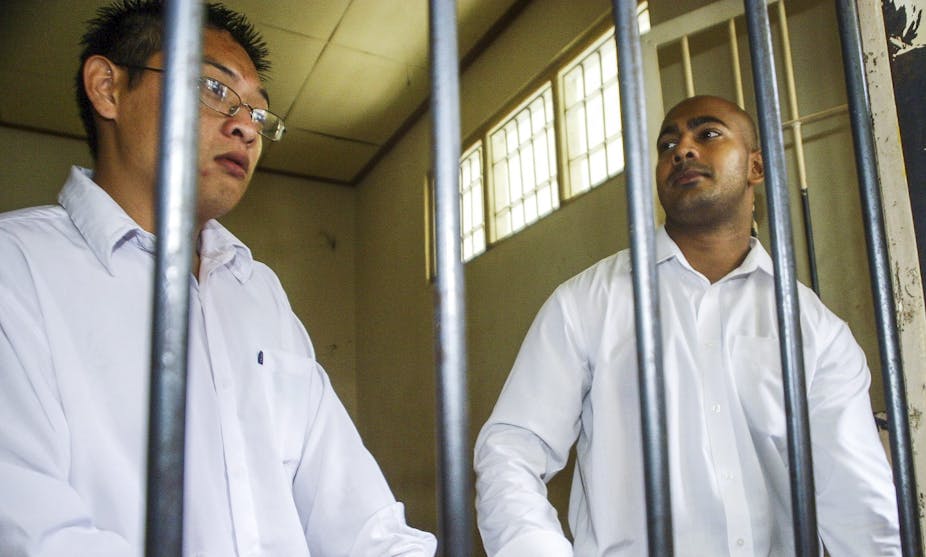The looming executions of Australians Andrew Chan and Myuran Sukumaran in Indonesia cannot be examined in isolation. They illustrate how the death penalty is always highly politicised; that rhetoric appeals to patriotic feeling; that hostility to the advice or requests of outsiders is deeply resented and counter-productive.
During Susilo Bambang Yudhoyono’s (SBY) ten-year presidency, there were 21 executions in Indonesia – most for murder, four for drug crimes. However, there were no executions at all between 2009 and 2012. There was a virtual moratorium in SBY’s last years, and there was misplaced optimism that he would commute Chan and Sukumaran’s sentences in the period between the election of new president Joko Widodo (known as Jokowi) and his inauguration.
Under SBY, Indonesia made very strong, and often successful, representations to foreign jurisdictions to prevent them from executing Indonesians. Currently, 229 Indonesians have been sentenced to death in other countries. Jokowi has announced that Indonesia would be campaigning vigorously to save them.
A disproportionate number of those executed and set for execution under Jokowi so far are not Indonesians. They include Nigerian, Ghanaian, Brazilian, French and Dutch citizens.
Jokowi is seen as pursuing populism to strengthen his position with the legislature:
It is popular to save Indonesians from execution in foreign jurisdictions;
It is popular to execute foreigners in Indonesia;
It is popular to object to foreign jurisdictions protesting about decisions to execute their nationals in Indonesia;
It is popular to execute to affirm national sovereignty against foreign criticism;
It is popular to assert that Indonesia faces a drug crisis and that executing drug smugglers demonstrates that strong action is being taken; and
It is popular to execute as a sign of strong leadership.
The decision to execute Chan and Sukumaran could be described as a “category condemnation”. They have crossed a threshold and the individual circumstances don’t matter, including evidence of remorse and rehabilitation over the past decade.
Jokowi has been quoted as saying that he had not read any of the individual files, and would not. When George W. Bush was governor of Texas, he was said to have spent around 30 minutes on each capital case. Jokowi’s approach goes back one step, then.
I heard a media claim that Jokowi had remarked that Chan and Sukumaran had been arrested smuggling drugs into Indonesia. This suggests that he has a shaky grasp of the situation but feels confident about making an irreversible decision. It was depressing to read of a student demonstration outside the Australian embassy in Jakarta supporting the execution of Chan and Sukumaran because they had been importing drugs that threatened the lives of young Indonesians.
Jokowi keeps repeating that the executions are just routine. They are “all a matter of law enforcement” and he is just “upholding the law”. But it is far more than that. There has been a complete failure of consistency about the Indonesian way of death for decades. He is remaking the law, almost casually, by whim.
Inevitably, those executed for drug offences are low on the pecking order. The major players are never caught – never punished, let alone executed.
Nobody comes out of this tragedy well.
Australia has been monumentally hypocritical on the death penalty abroad. We will not extradite persons held here to death penalty jurisdictions, even to our close ally the United States.
Nevertheless, the Australian Federal Police (AFP) has played an atrocious role, which it still defends on the grounds that sharing information with the Indonesian police provides more, in aggregate, for us than it does for them. Chan, Sukumaran and the rest of the Bali Nine should have been arrested in Australia before they flew to Bali rather than being arrested in Bali on the basis of information provided by the AFP.
In the case of the execution of three of the “Bali bombers” – admittedly a far more heinous crime, involving scores of Australian lives lost – Kevin Rudd and John Howard both gave explicit support for it to happen, and Stephen Smith a more nuanced version. Simon Crean, as Labor leader, was equivocal, but Mark Latham was more supportive.
I was silent on the issue because I was never asked to comment.
If I had, I would have maintained my commitment to a principle, even when the individuals involved were repellent and had committed dreadful acts in the name of an obsessive belief. This is the line that the late former New York governor Mario Cuomo always took.

